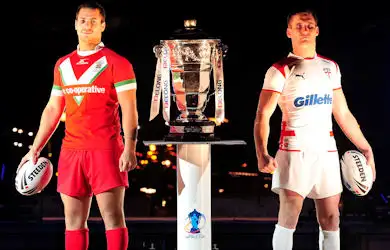2013 World Cup format revealed

The 2013 Rugby League World Cup has been officially launched after the RFL hosted a ‘kick-off’ event at Manchester’s new MediaCityUK development on Tuesday November 30.
The 2013 competition, which will be contested in venues throughout England and Wales, will be the 14th staging of the Rugby League World Cup and has already been backed by Rugby League legend Ellery Hanley and former Olympic medal winner Iwan Thomas. .
Speaking at the tournaments kick-off event held at MediaCityUK, in what was the first event of its kind to be held at the new venue, RFL Chairman Richard Lewis said, “It is a great boost for Rugby League in this country to secure the World Cup in 2013. The last tournament staged in Australia in 2008 was an enormous success.
“Our aim is to build on that success and to deliver a profitable tournament that further enhances the international game across the globe and raises the profile of the sport in the UK.”
Having been awarded the rights to host the event in June 2009, the RFL utilised the kick-off event to make a series of major announcements about the tournament, including the identity of 12 qualified teams and to outline the scale of its ambition to host the most successful Rugby League World Cup of all time.
Australia, Cook Islands, England, Fiji, France, Ireland, New Zealand, Papa New Guinea, Samoa, Scotland, Tonga and Wales have all been confirmed as competing nations and they will be joined by one qualifier from a European Qualifying group consisting of Italy, Lebanon, Russia and Serbia and one qualifier from an Atlantic Qualifying group consisting of Jamaica, South Africa and the USA.
The competition’s structure will consist of two groups of four, with England drawn alongside perennial foes Australia, Fiji and Ireland in Group A and World Cup New Zealand facing Pacific Island rivals Papua New Guinea, Samoa and France in Group B. Scotland will face Tonga and the European qualifiers in Group C and joints hosts Wales have been drawn against the Cook Islands and the Atlantic Qualifiers.
Speaking in the events promotional video, Prime Minister David Cameron also put the weight of the Coalition government behind the RFL’s announcement, emphasising the sporting potential the next decade offers.
“This government is right behind the RFL,” said Cameron. “As one of the sports that this country holds closest to its heart, we know what a privilege and honour it is to host this tournament and I’m fully confident that the RFL will do the United Kingdom proud and I look forward to working closely with them to make sure it is a great success.
“The next decade promises to be one of the most exciting in our countries history. There will be the Olympics, the Cricket World Cup, hopefully the Football World Cup and the Rugby League World Cup. Coming so soon after the Olympics, the RFL have the opportunity to ride on the crest of that wave and host and truly memorable tournament.”
First Minister of Wales Carwyn Jones added: “It is a privilege for Wales to be given this opportunity. We saw tremendous success during the 1995 World Cup when Wales was host to numerous fixtures and the Welsh public came out in force to support their home team and to witness some of the world’s greatest players.
“With Rugby League enjoying a new found growth in Wales in recent years and with the sport having been played in schools throughout the country for the past eight years, we are confident that hosting games in venues such as the Millennium Stadium will be a great way of helping boost the sport in Wales.
“Hosting such an event will also provide a welcome financial boost to those towns and cities who secure the right to host fixtures, training camps and house the playing squads and with the potential for many visitors set to be attracted to these shores, the economic impact has the potential to be great.”
Group A: Australia, England, Fiji, Ireland
Group B: New Zealand, France, Papua New Guinea, Samoa
Group C: Scotland, Tonga, European Qualifier
Group D: Wales, Cook Islands, Atlantic Qualifier
The top three in Group A and B will advance through to the quarter finals.
The team that finishes top of Group C and D will advance through to the quarter finals.
*In Groups C & D, the countries play the other nations in their group and also one team from the opposite group as indicated below (either C or D)
Scotland v Atlantic Qualifier
Tonga v Cook Islands
Wales v European Qualifier